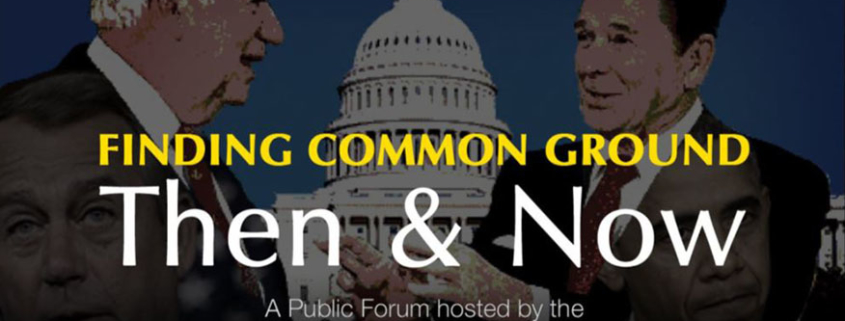
In this December 2013 public forum with David Gergen, former senior advisor to President Reagan, and Chris Matthews, former staffer to House Speaker Tip O’Neill, we explored stories and insights about the two political rivals. The panelists illustrated how the shared experiences and personal relationships between the two were the keys to finding points of agreement in resolving major issues. The event was moderated by John Yemma, editor of the Christian Science Monitor.
The history of bipartisan compromise between President Reagan and Tip O’Neill couldn’t be more relevant today. There are important lessons to be learned from their leadership styles and the relationship that drove the nation’s leading conservative and a classic liberal to find common ground in the 1980s.
The panelist’s recollections showed how President Reagan and Tip O’Neill, though fierce political rivals, were able to overcome differences and compromise on key issues. Gergen and Matthews expressed deep concern that our current political leaders were failing to demonstrate the Reagan-O’Neill kind of working relationship required to solve problems. But they also expressed hope for the future, citing great confidence in the generation just now entering the professional stage of their lives.
Among the points made during the discussion:
- At the end of the day, Reagan and Tip were always able to talk with each other. By virtue of their common Irish background, similar age and lots of time together on social occasions, they were able to get on the phone and discuss, if not iron out, their differences for the common good.
- An important factor in bridging ideological gaps between the two was the fact that they were part of a shared World War II generation. They thought of themselves first and foremost as staunch Americans. The country came first; always before party. Giving speeches and taking hard positions to satisfy their own supporters was not enough. There was a sense of urgency about delivering the goods.
- On stabilizing Social Security and reforming the tax code, both were willing to make concessions that neither was happy with. But despite reservations, they were able to persuade their respective Congressional allies to accept the compromises.
- Today, legislators aren’t establishing relationships of trust across the aisle. There is little effort to socialize or spend casual time with one another in Washington. If you want to reduce partisanship, you’ve got to learn to respect one another’s point of view. Congressmen tend to leave town on Thursday and return on Monday night. Moreover, their families stay back in the district or at home.
- The 24/7 news cycle makes it much harder to keep secrets during delicate negotiations. In the 1980s, it was much easier to maintain a confidential relationship between the president and speaker. They should be able to talk to each other candidly and not fear leaks to the media.
- Today’s media is at fault for discouraging the expression of moderate views on controversial issues. There is always the temptation to look for the extremes on either side rather than seek common ground. TV hosts prefer firebrands who are put on the air because it builds viewership and ratings.





